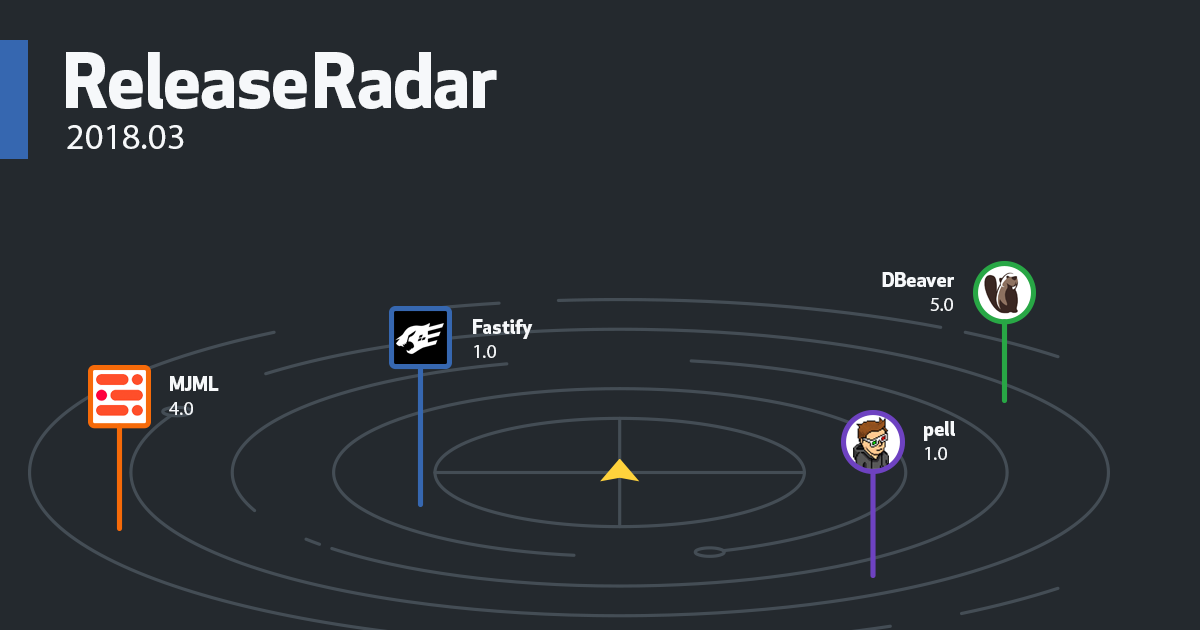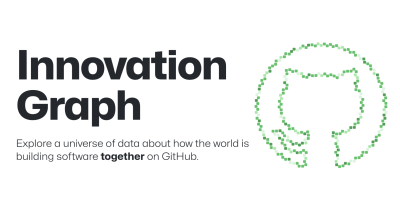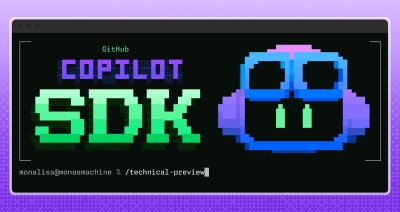Lee Reilly
Senior Program Manager, GitHub Developer Relations. Open source hype man, AI whisperer, hackathon and game jam wrangler. I write && manage programs, support dev communities, and occasionally ship something.
In case you missed them, here are some of the releases that caught our attention last month.

March flew by, but you shipped some not-to-be-missed releases last month. Here’s a list of the ones that hit our radar—many of them 1.0s!
Congratulations to Fastify, which has reached a milestone 1.0 release. If you couldn’t guess from the name, Fastify is a Node.js web framework with an emphasis on speed. In addition to speed, Fastify has a flexible plugin system and 60 officially-recognized plugins. Version 1.0 solidifies the API and begins a period of long term support, with a commitment to security fixes. Be sure to read the Fastify 1.0 release announcement for more details.
Impress.js is also celebrating a 1.0 release. Have you ever wished you could make a presentation in your text editor instead of fighting with Keynote or PowerPoint? Your wishes can come true with impress.js, a presentation framework that uses HTML and CSS transformations. The 1.0 release marks the introduction of a plugin architecture, Markdown support, and a new lead maintainer. Check out the release announcement and get a taste with these examples.
Did you know? Impress.js has been used to create countless presentations, like this Python workshop from the University of Tehran (source repository) that uses substeps, syntax highlighting, and 3-D space.
OpenPGP.js is an OpenPGP implementation written entirely in JavaScript. The project wants to make it possible “to sign, encrypt, decrypt, and verify any kind of text” without relying on native code. The version 3.0 release includes performance improvements, public-key cryptography using elliptic curves, and some improvements to the library’s internal development (like refactoring to ES6 variable declaration syntax). See the release announcement for more.
Did you know? OpenPGP is an internet standard for encrypted email.
It feels like a bit of an understatement to say that DBeaver is a cross-platform SQL client. They call it the “universal SQL client” and for good reason: it supports MySQL, PostgreSQL, Oracle, SQLite, Microsoft Access, and many others. DBeaver’s 5.0 release introduces a (beta) PostgreSQL debugger, niceties like automatic reconnecting, and a load of bug fixes. Check out the release notes for more details.
Legit is another project being welcomed into the version 1.0 club. Legit is described as “Git for Humans.” Inspired by GitHub Desktop, Legit adds shortcuts to the Git command line interface. It simplifies synchronizing with remote repositories, publishing new branches, or undoing commits. Legit 1.0 improves help messages, adds new –fake and –verbose options so you can see what’s happening under the hood, and cleans up some installation and configuration commands. Even Git experts will want to check out these convenient additions.
Did you know? Kenneth Reitz, the creator of Legit, used to be a guest blogger for us back in the day with the GitHub Reflog.
Plyer is an HTML5 video player that can also embed Vimeo and YouTube videos. The release notes call version 3.0 a “massive release” that rewrites most of the video player in ES6. Apart from the substantial rewrite, it adds new features like support for Safari’s picture-in-picture mode, YouTube quality controls, and more.
Did you know? Plyr showcases how open source is being used by companies around the world, from sports magazines to automakers.
Pell makes a bold and convincing claim to be “the simplest and smallest WYSIWYG text editor for web.” At just 3.5 kilobytes minified, it certainly is small and covers all the basic formatting you’d expect from an editor: bold, italic, headings, lists, quotes, and more. Version 1.0 trims some extraneous styles and fixes bugs. Check out the release notes for more information.
MJML is a high-level framework that helps you design responsive emails. Version 4.0 introduces some control over how the Outlook web app renders your messages, customization for the default breakpoints, column gutters, bug fixes, and more. Read the release notes for more info.
Did you know: The MJML community has created a bunch of tools to work with MJML, including an Atom package.
Workbox is a collection of JavaScript libraries for developing Progressive Web Apps that go offline gracefully with service workers. The version 3.0 release of Workbox shrinks the size of the library, kicks off official CDN support, and improves debugging and logging. Take a look at the full release notes though, because there’s a lot more.
rc.rectangle(15, 15, 80, 80, { roughness: 0.5, fill: 'red' });
rc.rectangle(120, 15, 80, 80, { roughness: 2.8, fill: 'blue' });
rc.rectangle(220, 15, 80, 80, { bowing: 6, stroke: 'green', strokeWidth: 3 });
rc.rectangle(320, 15, 80, 80, { fill: 'red', stroke: 'blue', hachureAngle: 60, hachureGap: 10, fillWeight: 5, strokeWidth: 5 });
rc.circle(460, 55, 80, { stroke: 'red', strokeWidth: 4, fill: 'rgba(0,255,0,1)', fillWeight: 4, hachureGap: 6 });
rc.circle(510, 55, 80, { stroke: 'blue', strokeWidth: 4, fill: 'rgba(255,255,0,1)', fillWeight: 4, hachureGap: 6 });Rough.js is a library that helps you use the Canvas API to make shapes that look hand-drawn. It can be used to draw lines, simple geometric shapes, or complex SVG paths. Version 2.0 fixes bugs, improves documentation and examples, and adds support for asynchronous drawing, so complicated shapes don’t block the main thread. Check out the project on GitHub.
Did you know? There’s a Snake clone made with Rough.js for those times you’re feeling nostalgic for your old Nokia feature phone. Play it here or view the source.
That’s just a handful of releases you shipped last month—keep them coming! If you’ve got a release that should be on our radar, send us a note.

Discover the latest trends and insights on public software development activity on GitHub with data from the Innovation Graph through Q3 2025.

Read GitHub’s position on the European Open Digital Ecosystem Strategy and learn how to participate.

Now in technical preview, the GitHub Copilot SDK can plan, invoke tools, edit files, and run commands as a programmable layer you can use in any application.